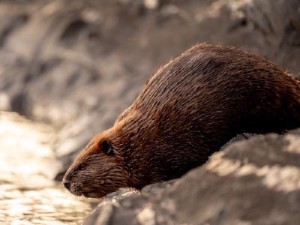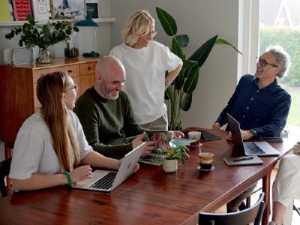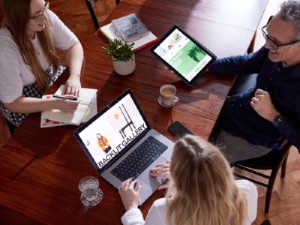- Insights
- Learnings from the 1% For The Planet European Summit
Learnings from the 1% For The Planet European Summit
Michelle Pavey
Strategy Director
Held at the awesome Patagonia headquarters in central Amsterdam, we were pleased to sponsor the event and be a part of the 100 strong delegation of members in attendance.
The summit aimed to provide insightful talks and debate around the subject of environmental giving and what more we can be doing to make a meaningful change to the state of the climate change crisis which is facing us. After being thoroughly inspired by the members we met and the subject matter discussed, we wanted to share the key themes debated for the attendees and for those who couldn’t make it.
Who are 1% for the Planet? 🔗
1% For The Planet is a global network of businesses, nonprofits and individuals working together for a healthy planet. More than $175m has been given back to the environment to date. They work to directly connect businesses with approved non-profit organisations to ensure donations go straight to where it is needed.
Creative giving for the greatest impact - the reality
Kate Williams, CEO 1% For The Planet, opened the session with a realistic view of the state of current philanthropic giving to the environment. This view was sadly quite bleak, with Kate sharing that currently, only 3% of giving goes to environmental causes.
“Only 3% of philanthropy goes to environmental sources”
Despite 1% For The Planet working hard to recruit thousands of members globally, the stark reflection was that so much more needed to be done to engage with people on the huge issue of climate change.
The panel session, chaired by Georgia Phillips from Pukka Herbs, and including Hugo Tagholm (Surfers Against Sewage), Marie Noelle Keijzer (We Forest Org), Dawn Betteridge (Fossielvrij NL) and Nicholas Bornstein (Protect Our Winters) built upon Kate’s previous comments and discussed the importance of Non-Government Organisations (NGO’s) and businesses working together for the greatest impact. The general consensus was that NGO’s should lead the campaigns and work by utilising support and expertise from Business to build a shared vision for the greater good. Working together should be about shared responsibility and a desire to drive a change from within the person and then the organisations/brands they work for.
Authentic storytelling 🔗
This concept was not only the subject of the second-panel session but also a key theme which ran throughout the whole day. It is not simply about a business putting money into an environmental organisation to meet its corporate social responsibility plans or becoming more environmentally friendly because it is ‘on trend’ but, to be authentic and engage with your own staff, clients and consumers, you must really believe in the cause and partner with an organisation that aligns with your brand in order for it not only to be authentic but to be a real basis for a long-term commitment to making a difference. The panel, chaired by Steph Pomphey (co-founder Huck magazine), Natasha Hurden ( Rebel Kitchen), Matt Pycroft (Coldhouse Collective), Ana Rodrigo (Biolage, L’Oréal) Jari Salo (Jari Salo Design) and Madelyn Postman (Leidar) debated these key points and reiterated the message that to be remembered and make a difference we must tell a compelling story which engages with people on all levels, because the power of the collective is critical and if we continue to work together, then we can make a real change.
No challenge is too big 🔗
Refreshingly, this point came across throughout the day but none more so than in the motivational presentation from James Whittle and Tom Caulfield ( The Tempest Two). A duo, who over a drunken text exchange decided to row from Gran Canaria to Barbados having never rowed before. Their challenge was an immense test of mental and physical resilience and one which would change their outlook on their own capabilities and importantly what could be overcome when people work together to achieve a shared goal. As they rowed across the ocean they also saw first hand the damaging effects of plastic waste on the environment and thus were also inspired to become a member of 1% for the Planet. This point was also centric to Francoise LeMerchande’s (co-founder of Nature et Decouvertes) keynote discussion. She explained her love of nature, and that this had given her and her husband the desire to build a business based on joint values of preserving the planet for their children and beyond. This was not a popular decision at the time but they believed in it and persevered to make it central to their business operations.
Patagonia’s Mihela Hledin Wolfe led a pertinent discourse around the significance of activism, particularly from a grassroots level. Given the global political climate, it is more crucial now than ever before that we seek to question what we are told and to stand together to progress needed change that may well be ignored by governing systems.
Mihela outlined the work Patagonia continues to do in this area and how they embed this passion for activism and change in all of their employees, encouraging them to take a stance and do the best they can do for the company and the planet at the same time. Patagonia’s mission statement has a fundamental message which should be considered by us all as something to work towards.
“Build the best product, cause no unnecessary harm, use business to inspire and implement solutions to the environmental crisis.”
Finally, Mihela outlined the value businesses could add if they put change at the heart of their work and built a safe place where users/followers/customers can learn about the issues and advocate a progressive long-term movement rather than just to use the opportunity as a short-term transactional campaign.
We thoroughly enjoyed listening to all of the thought-provoking and stimulating sessions at the summit and would encourage you to find out more about the work being done by 1% for the Planet and its members. The threat of an environmental crisis is real and daunting, but being part of a movement such as this and hearing from organisations on how they are combating this challenge really filled us with a hope that collectively we can make a change.
The European Summit has inspired us to do more to further reduce our environmental impact and create some positive change, both within our organisation and elsewhere. We’ll be working over the next few weeks to come up with a plan to make that happen.


